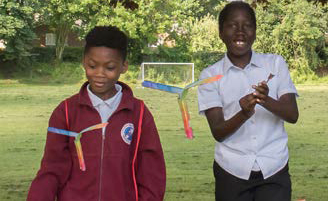Reimagining Schools with Permeable Walls
This project is a collaboration between secondary schools and researchers and it is already running in many schools in England. The ambition now is to expand internationally.
The aim in each school is to co-create a whole-school approach to helping students to become epistemic agents. The project benefits from and contributes to an international agenda by the OECD Future of Knowledge and Skills 2030 project. This calls for a different approach to curriculum design that shifts attention from ‘what we know’ to ‘how we know what we know’ and opportunities for student agency. The OECD Learning Compass includes a key term called ‘epistemic knowledge’.
The Epistemic Insight Curriculum Framework
When pupils become more epistemically insightful, the first step is to appreciate that some questions can be investigated within a chosen discipline (e.g. in science, we investigate questions about the natural world); Students also learn to recognise and discuss epistemic questions about disciplines (e.g. what kinds of questions do biologists tend to investigate?)
The next step is to help students to appreciate that disciplines can also work together. At this point, teachers create ‘bridging questions’ which can help students to see two how complementary and distinctive disciplines approach a shared question. For example a question about how and whether to restore a Renoir portrait to its original colours bridges engineering and art. This helps with critical thinking because students now appreciate that they can often get a broader perspective on a question or knowledge claim by exploring it through another discipline.
The third step is to appreciate that epistemic knowledge can help you to come up with better ways to address real-world opportunities and problems. For example during the pandemic, scholars from many different disciplines came together to work on strategies to help to keep the public safe. At first the emphasis was on how to slow the spread of the virus and disciplines like biology played lead roles. As the pandemic progressed, more disciplines were brought into policy debates as it became clear that lockdowns were having negative impacts on education and mental health, as well as positive impacts on slowing the spread of the virus.
A Global Perspective
Our proposal is that the project will be supported by a partnership between the OECD Education 2030 project, UNESCO Education and the Epistemic Insight Initiative and will draw on global networks of schools signed up to ASPNet, the OECD and EI schools. It is our hope that by understanding the relationships between and distinctive contributions of different disciplines students and educators will become better equipped to draw together scientific, cultural and spiritual aspects of being human when they address global problems and opportunities like sustainability and space travel.
Encouraging Student Agency
At an event dedicated to the Future of Knowledge, that we held at the Royal Society of Chemistry in London, we were joined by Dr Suzanne Dillon, Chairperson and governmental representative for Ireland in the OECD Future of Education 2030 project. Here is how Dr. Dillon (2022) explained student agency to an audience of teachers, students and academics at that event:
“In a classroom where student agency is encouraged, students feel they have a purpose in learning, they can direct their attention to that purpose and they can be engaged and excited by it, and above all else they can learn that by asking questions and continuing to question their understanding of the world – and that’s at the core of flourishing.”
Dillion, Suzanne (2022). Personal Communication. Royal Society of Chemistry. London.
Thus inspiring epistemic agency in students is not simply about getting students to ‘take responsibility’, it is about inspiring them to think beyond their exams and tests so that their questions, interests and intellectual curiosity transcends the classroom and follows them wherever they find themselves in the world.
When we met at the Royal Society of Chemistry for our launch event, the EI Flourishing Schools team met with Advisors and Consultants to discuss how to internationalise this project. The meeting was chaired by Suzanne Dillon, Chairperson of the OECD Future of Education and Skills 2030 project







